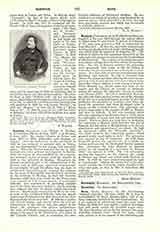

Rostock, UNIVERSITY OF, in Mecklenburg-Schwerin, founded in the year 1419 through the united efforts of Dukes John IV and Albert V, and on February 13 of the same year granted a Bull of foundation by Pope Martin V. At first the university included only the three secular faculties; in 1432 a theological faculty was added with the approval of Eugenius IV. The Bishop of Schwerin was appointed chancellor of the university; his present successors are the Grand Dukes of Mecklenburg. The majority of the professors came from Erfurt, among them the first rector, Petrus Stenbeke. The city of Rostock endowed the university most generously with lands, as did the Bishop of Schwerin, who presented his house at Rostock as a residence. At a later date it received contributions from Hamburg and Lubeck. In 1427 it obtained from Martin V a unique privilege, allowing the rector in conjunction with several doctors to bestow a degree if the chancellor refused without a valid reason to grant it. When Rostock was placed under the bann of the empire and the Church on account of outbreaks among the citizens, the university moved to Greifswald (Easter, 1437). In 1443 it returned to Rostock, but when the dukes wished to raise one of the churches of the city to a cathedral-church in order to give the professors the canonries as benefices, the town opposed the procedure and there developed what is known as the cathedral feud. The university migrated temporarily in the summer of 1487 to Wismar and then to Lubeck. It fell into complete decay after the beginning of the Reformation in (1523) when the university revenues were lost and matriculations ceased. When an effort was made later to reorganize the university a dispute arose between the city of Rostock and the dukes of Mecklenburg as to the administration and supervision of the school. In 1563 an agreement called the “Formula concordiae”, was made between the contending parties, which granted nearly equal rights to both. The university now enjoyed an era of prosperity. In 1758 Duke Frederick desired the appointment of a rigidly orthodox professor, but the theological faculty opposed him; whereupon the duke obtained an imperial patent for the founding of a university at Butzow which was opened in 1760. The two universities proving too expensive for the country, the school at Butzow was closed and united with Rostock in 1789. In 1829 the town council renounced its right of co-patronage. During the second half of the nineteenth century the University began steadily to develop and gain, so that in 1911 it had about 800 students.
KARL HOEBER

